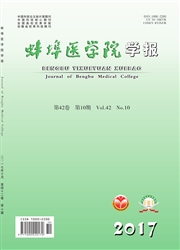

 中文摘要:
中文摘要:
目的:探讨RNA干扰(RNAi)N-Ras基因增强人肝癌HepG2细胞的放射敏感性。方法:通过构建干扰N-Ras基因siRNA,采用免疫组织化学、荧光定量RT-PCR、Western blot、MTT法等观察干扰前后的肝癌HepG2细胞RNA水平、蛋白水平、生长情况等变化。用细胞克隆计数实验检测放射敏感性变化。结果:肝癌HepG2细胞株干扰后mRNA、蛋白、免疫组织化学、生长情况均显著改变,HepG2细胞RNAi前后增敏比SER=1.10。结论:RNAi肝癌HepG2细胞N-Ras基因可以达到放射增敏的目的。
 英文摘要:
英文摘要:
Objective:To investigate the radiosensitivity of silencing N-Ras by RNA interference in Hepatoma carcinoma cell HepG2.Methods:N-Ras RNA interference(RNAi) vector was constructed by using pcDNA 6.2-GW/EmGFP-miR plasmid.The RNAi effect was detected by RT-PCR,Western blot,immunohistochemisty and MTT method.Survival curves for each cell line were obtained by measuring the colony forming abilities of irradiated cell populations.Results:After silencing the N-Ras by RNAi,the expression of N-Ras mRNA,N-Ras protein and the survival of hepatoma carcinoma cell HepG2 line were significant difference in statistics.Conclusions:RNAi targeting silenced N-Ras may increase the radiosensitivity of hepatoma carcinoma cell HepG2 line.
 同期刊论文项目
同期刊论文项目
 同项目期刊论文
同项目期刊论文
 期刊信息
期刊信息
